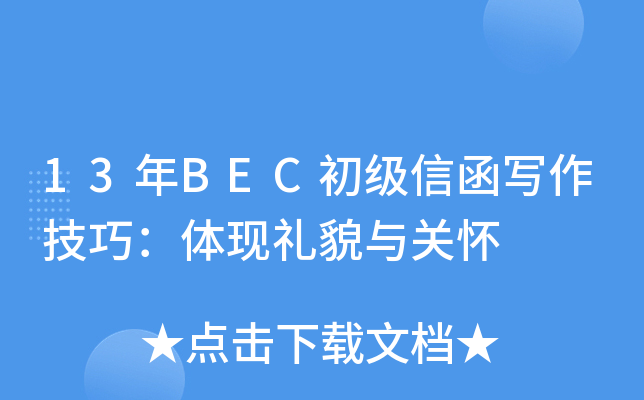a) We have received with many thanks your letter of Oct.7, and we take the pleasure of sending you latest catalog. We wish to draw your attention to a special offer, which we have made in it. [polite]
b) you will be particularly interested in a special offer on page 5 of the latest catalog enclosed, which you requested in your letter of Oct. 7.
You ought to Perhaps you could…… Your letter is not clear at all; I can't understand it. If I understand your letter correctly... Obviously, if you'd read your policy carefully, You'd be able to answer these questions yourself. Sometimes policy wording is a little hard to understand glad to clear up these questions for you. [courtesy]
怎样通过各种语言形式来表达COURTESY呢? 这样的形式很多,现在提供一些常见的供参考:
(一) 把命令变成请求的常用形式:
Please, Will you…….., Will you please……..,如:
a) Will you give us more detailed information on your requirement?
b) Will you please (kindly) let us hear from you on these two points?
(二) 虚拟式(Past Subjunctive From)如:
a) Would you compare our sample with the goods of other firms?
b) We would ask you to ship the goods by the first available vessel.
c) We wish you would let us have your reply soon.
d) This would seem to confirm our opinion.
e) We should be grateful if you would help us with your suggestion.
f) We think if advisable that you should accept this offer at this price.
g) We should(would) like you to let us know the exact amount.
h) Perhaps you might like to have a look at the actual goods.
i) We might be of some service to you in a similar case.
以上的b, f, g, 也可用 will, shall, may, 但是用Past Subjunctive Form则表示更客气和婉转些。
(三) 缓和用法(Mitigation)
为了缓和过分强调或刺激对方,常用: We are afraid, we would say, we may(or, might) say, we(would) think, it seems(or would seem) to us, we(would) suggest, as you are (or: may be) aware, as we need hardly point out等等表达法来缓和语气,如:
a) It was unwise of you to have done that. We would say that it was unwise of you to have done that.
b) You ought to have done it. It seems to us that you ought to have done it.
c) We cannot comply with your request. We are afraid we cannot comply with your request.
d) Our products are the very best on the market. We might say that our products are the very best on the market.
e) You must keep the matter to yourselves. You must, we would add, keep the matter to yourselves.
f) You must cut off your order in half We would suggest that you cut your order in half.
g) We have not yet had your reply. It appears that we have not yet had your reply.


